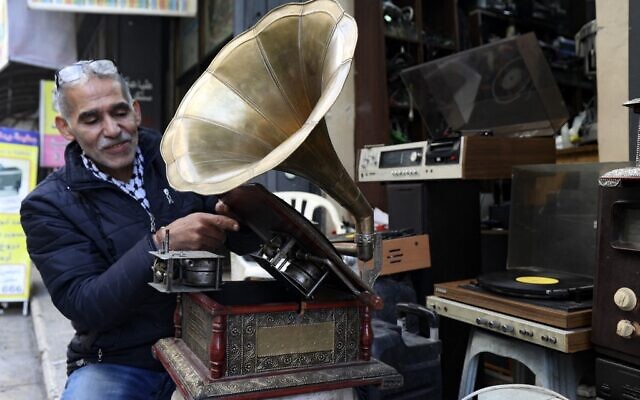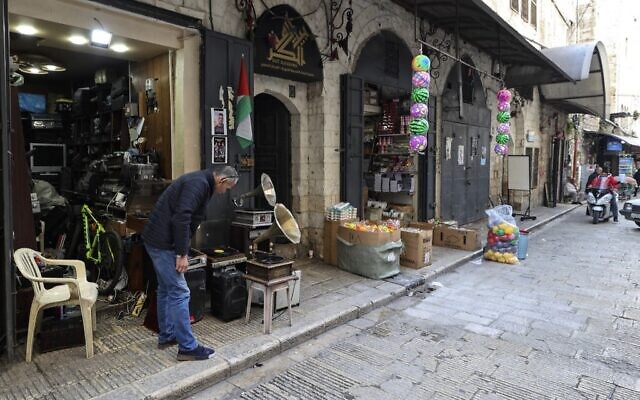NABLUS (AFP) — From Jamal Hemmou’s ramshackle workshop in Nablus’s Old City in the West Bank, classic Arabic songs blare into the surrounding cobbled streets.
The 58-year-old is the last of his kind in the city — he runs the only shop in Nablus repairing and selling vinyl records and players.
Like much of the world, Nablus is attuned to digital music, but Hemmou told AFP working with vinyl was about preserving Palestinian “heritage.”
Elderly people regularly pass by at the end of the day and, “when I turn on the record player, they start crying,” he said.
Hemmou began learning how to repair record players when he was 17, listening to the great Arab artists of the time as he worked.
Get The Times of Israel's Daily Edition by email and never miss our top stories
“I have more experience than the people with the certificates,” he joked, adding that he is entirely self-taught, and acquired his passion for music from his father. “My father was a singer, he used to sing because he loved those old singers… almost everyone in my family is a musician,” he said.

Jamal Hemmou checks an antique gramophone (phonograph) record player in front of his shop in the West Bank city of Nablus, January 17, 2023. (JAAFAR ASHTIYEH / AFP)
Hemmou said he enjoys Lebanon’s Fairuz and Egyptian superstar Abdel Halim Hafez, but his favorite is Shadia, an Egyptian diva who released a string of hits between the 1940s and 1980s.
“She sang from the heart, she sang with emotion, she told a story,” he said.
Strewn throughout his workshop, in various stages of repair, are record players from the 1960s and 1970s. There are even several gramophones from the 1940s. He estimated that he sells an average of five record players per month.
‘You’re transported back’
As violence in the West Bank has soared in recent months, Hemmou said it’s not IDF raids that hurt business — it’s the strikes regularly called by local authorities in response to Israeli operations.
“We close all the shops when the Israeli raids kill someone in Nablus, especially the Old City,” he told AFP.

Jamal Hemmou displays old record players in front of his shop in the West Bank city of Nablus, January 17, 2023. (JAAFAR ASHTIYEH / AFP)
For Hemmou, the machines and the music they play are more than just songs, they are an essential part of Palestinian and Arab heritage.
“When you play the record, you’re transported back 50 years,” he said. “You listen to this music, and you remember what it means to be an Arab or a Palestinian,” he added.
Hemmou said that today’s artists don’t match the emotion of the great Arab singers of the 20th century.
“The modern singers do not know what they sing. The old singers, they summon what is deep within us and they revive our heritage,” he said.
Music as resistance
Known throughout the old city as Abu Shaadi, he has developed a reputation beyond Nablus. Music enthusiasts travel from afar to buy from him.
“My customers are from all over the West Bank, from Jerusalem, from Nazareth, Bethlehem, Jenin, Qalqiliya,” he said. “They come from all of Palestine to buy from me.”

Jamal Hemmou shows vinyl records in his shop in the West Bank city of Nablus, January 17, 2023. (JAAFAR ASHTIYEH / AFP)
Hemmou said he has tried to bring his two sons, aged 26 and 27, into the business.
“They aren’t interested,” he told AFP. “They tell me to turn it off, they don’t want to listen.”
The street on which his shop sits has seen fierce battles during the last year, as Israeli forces conducted raids targeting a new terror group called “Lion’s Den,” based in Nablus’s Old City.
The shop bears reminders of the conflict — plastered on its shutters are the images of Palestinian fighters killed in recent months.
“When there are clashes we have to close the shop, of course, but what can I say, I am still alive, thank God,” he said. “I play some national songs, that is my way of resisting.”


